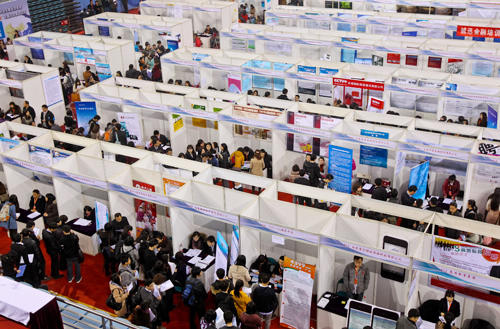|
 |
|
JOB HUNTING: At a job fair for graduates at Peking University on March 20, about 10,000 students try their luck for 6,000 vacancies provided by more than 200 employers (ZHANG YU) |
Finding the right person for the job is human resource (HR) manager Nancy Ren's mission. Ren works for an information technology firm in Beijing, where despite the large pool of talent, filling an open position at the company has become as arduous a task for her employers.
"We usually put each candidate through three rounds of tests and interviews. But even after spending that amount of time and energy, the chances of us finding the right person are still relatively low," Ren said.
Out of 10 candidates, Ren's company is lucky if they find one who fits their needs. And sometimes, when a candidate is chosen, that person proves unsuitable for the job or falls far short of expectations.
While most Chinese companies still rely on group discussions and professional examinations to assess candidate competence, most of their advanced global counterparts are turning away from traditional searching and assessment methods in favor of talent measurement solutions in finding the right people for the right roles. Talent measurement gauges candidate competency by providing genuine insight into employee's capabilities and producing objective, consistent and meaningful data for upper management.
"The world's top 500 companies have discarded the old ways of hiring in favor of new, innovative methods," said Louis Yang, a business psychologist.
According to a survey conducted by China International Intelligence Co. Ltd., a Shanghai-based HR service provider, almost half of China's enterprises have yet to use talent measurement tools in recruiting—but many are looking to switch gears in the next two years and incorporate talent measurement into their hiring practices.
"Talent will play a vital role in China's economic transformation while the country switches its investment-driven growth model to one dependent on talent," said Fu Quan, General Manager of SHL China, a professional talent measurement solution provider headquartered in the UK.
With great market opportunities in sight, more international talent measurement providers are expanding their global footprint in China.
Over the last five years, SHL has focused its resources on the Chinese market. According to Fu, SHL doubled its staff and investment in China last year. In April, SHL expanded its main office by eight fold in Shanghai.
"These latest changes give our organization an even stronger platform to serve our customers in China," said David Leigh, CEO of SHL.
What's raised SHL's confidence in China is the excellent performance it has achieved in the Chinese market.
"During the past three quarters, our average profit witnessed an increase of 80 percent year on year," said Fu.
China's talent strategy provides huge growth potential for the talent assessment sector. According to the National Program for Medium- and Long-term Talent Development (2010-20), there will be 42 million business managers ready for hire by 2020. The enormous demand to develop business management talent is gradually turning talent assessment from being a branch of HR development into the mainstream.
"Assessment demand has skyrocketed for companies of all sizes in China—from state-owned enterprises (SOEs) to multinational corporations and businesses in the private sector," said Fu.
According to Fu, SHL China's clients were all multinationals in China three years ago. Today, 40 percent of their clients are local enterprises.
"Usually the local enterprises we serve have bigger employee hiring requirements than multinationals. That means bigger business volume," said Fu.
China's booming recruitment market also gives HR service providers reason to rejoice.
According to a survey conducted by global recruitment firm Michael Page International based in the UK, business confidence in China is high, leading to a stable recruitment market.
Among employers surveyed, there is favorable sentiment toward both domestic business conditions and hiring additional staff. Some 79 percent of employers predict business conditions will either improve or remain stable in the coming months, while 56 percent expect to boost headcount in their business.
| 